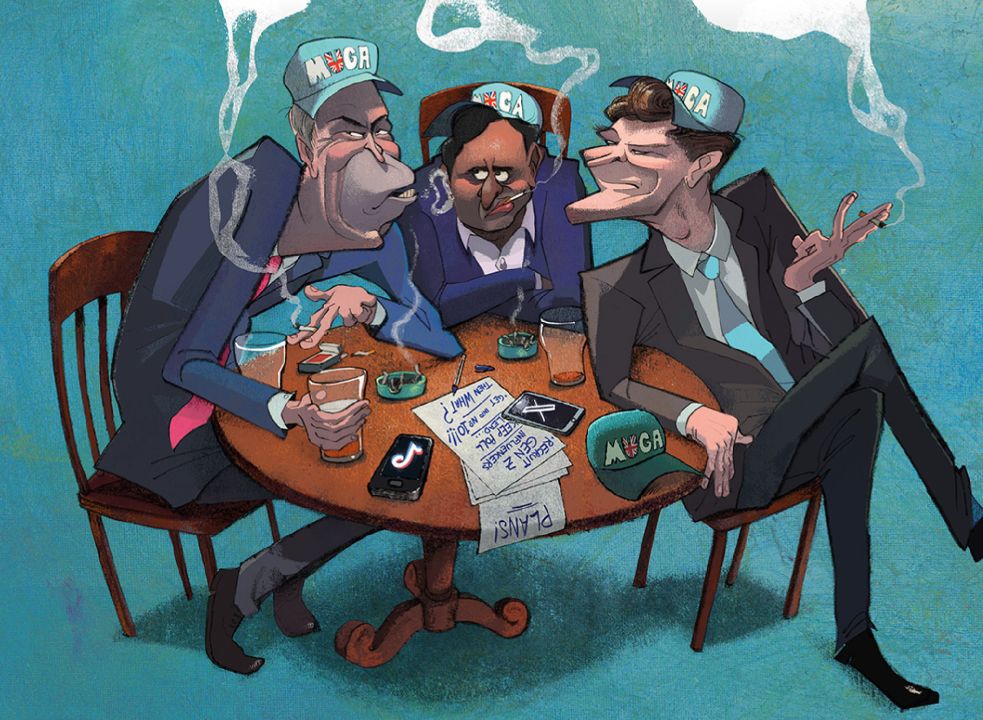
In early June last year I had a reasonably agreeable meal with a bunch of Reform UK activists at a restaurant in Guisborough – the main town in the seat which I would be contesting for the Social Democratic party, Middlesbrough South and East Cleveland. There were four of them, united primarily by one thing – a visceral loathing of the Conservative party.
Beyond that they were basically anti-woke and economically dry, as we used to call it. But all that took second place to the animus against the Tories. I have met pink-haired, nose-ringed, utterly vacuous LGBTQI sociology students who were more kindly disposed to the Conservatives than this lot.
They were, then, the perfect expression of what Rupert Lowe last week called a ‘protest party’, except that back then they didn’t yet have a messiah. He came along later, transforming what might have been a very lacklustre Reform campaign ending, most likely, in no seats whatsoever, as Rishi Sunak had intended by calling an early election. When the messiah did turn up, they managed only five, even if their national vote should – under a decent system – have given them somewhere in the region of 50.
So both Lowe and Nigel Farage are right, in a sense. Reform UK is indeed a protest party led by the messiah. And Farage is absolutely right to insist that if he hadn’t upset the apple cart by announcing his leadership and candidacy, Rupert Lowe wouldn’t have come close to winning Great Yarmouth. There, you see – I have come to heal, to pour oil on troubled waters.
There are other disagreements, of course, and yet they seem footling. Lowe is marginally more in favour of Tommy Robinson than is Farage, although even Lowe contends that he is ‘not right for Reform’. Farage’s blanket dismissal of Robinson is, I suspect, more pragmatic than deeply felt, and he was unfortunate that it drew the ire of Elon Musk. It may be, too, that Musk’s favourable comments directed towards Lowe – despite confessing he hadn’t the slightest clue who the hell he was – may have embedded within Lowe’s brain intimations of greatness, of leadership.
It is also true that Farage runs Reform UK like a personal fiefdom, in an autocratic manner, as Lowe has averred. My suspicion is that Farage thinks he is perfectly well within his rights to do this, being the only member of his party who is recognised by the public and the only one who has had what we might call success, politically.
You cannot simultaneously be a nationalist and an internationalist
Reform was ticking over nicely when led by Richard Tice but, as I’ve said, would have come nowhere near any electoral success last July. The Guardian, meanwhile, has suggested that Lowe is well to the right of Farage – and cited Lowe’s enthusiasm for repatriation, as the old NF used to call it. Farage is against, but once again largely for pragmatic reasons.
Otherwise there does not seem to be a great difference between them politically. Both are fervent disciples of the blessed Margaret and on social issues would have been perfectly at home in the old Monday Club. On economic issues they are both anti-taxers at heart, if not libertarians.
And so it is interesting that the first major schism in this nascent party has come between two people who basically agree with each other about a small state and reduced tax burden, given that Reform UK is currently trying to woo those Red Wall voters by promising to nationalise the railways and so on. If there were to be an ideological split in Reform, that is surely where it would come.
And in that you have Reform’s problem: it is still a protest party and does not have any ideology, as such. Even on the subject of migration, the party’s biggest vote-winner, there is among many at the top of Reform no small affection for the notion of free trade and free movement of labour. They are, as I have said, pro-business libertarians.
I have argued for a long while that the party will find it very hard to rise above about 25 per cent in the polls, and indeed that is roughly where they have been stuck for the past few months, despite a deeply unpopular government and an almost nonexistent opposition. This, I think, is a consequence of the party being in essence, as Lowe says, a protest party and also being seen as ‘far right’, no matter how stupid a term that may be. But it is also because there is a contradiction at Reform’s heart: you cannot be a free trader and in favour of free movement of labour and protect the jobs and incomes of your indigenous workforce. In other words, you cannot simultaneously be a nationalist and an internationalist. And in making commerce king, you become internationalist.

If you look at the parties in Europe which have been called by the media ‘far right’, none has clawed its way above about 25 per cent in the polls while pursuing a right-wing economic agenda. Look, for example, at the AfD in Germany. The populist parties in Europe that have succeeded in gaining power have tended to be protectionist and redistributivist, mixing a sometimes splenetic anti-liberalism with what we might call Old Labour concern for the working class. This is true of the Social Democrats in Slovakia, the National Rally in France and, to an only slightly lesser extent, Fidesz in Hungary.
More strikingly, it is also true of Donald Trump. We may not be accustomed to thinking of him as being ‘left-wing’, but trade tariffs which protect the jobs of domestic workers are precisely that. There is a Blue Labour side to the Trump administration – which is perhaps why the architect of Blue Labour, Lord Glasman, was the only Labour figure invited to the inauguration.
The current spat in Reform is personal and a little petty. What lies beneath, though, is potentially far more destructive.









Comments